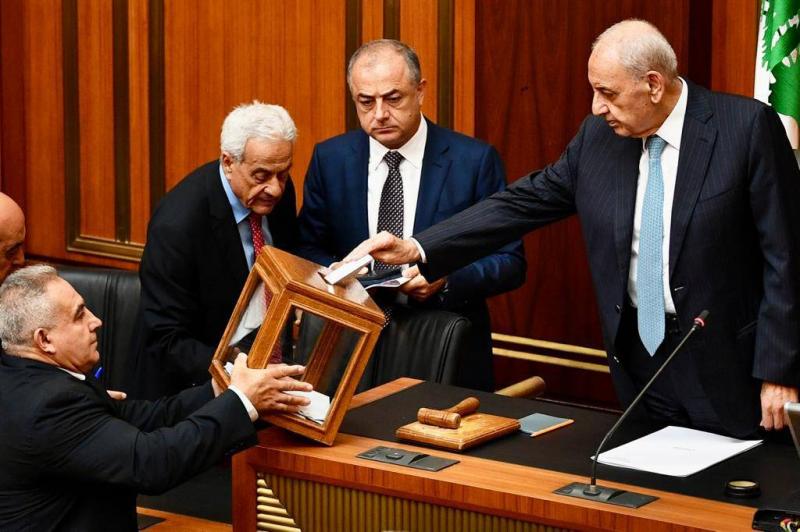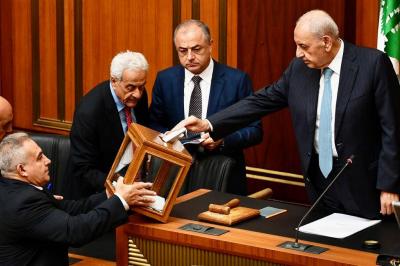The twelfth session for electing the President of the Republic was held amidst various scenarios regarding its course, which was deemed the most exciting, despite the awareness of all parties that it would not yield a president. However, it did determine the balance of power between the two main factions in the country. The developments followed the context of previous sessions, where the quorum was met in the first session, but disrupted in the second round. There were no surprises, knowing that the vote count received by former Minister Jihad Azour (59 votes) did not meet expectations and statistics indicating he might approach 65 votes, while "Marda Movement" leader Sleiman Frangieh received 51 votes.
Thus, after five months from the holding of the eleventh presidential election session on January 12, the twelfth session can be categorized alongside its predecessors as farcical. It is important to highlight that there are local and international pressures to elect a president as soon as possible, with the American administration threatening sanctions against those obstructing the election. The question remains: Will they carry out their threats? What will be the international community's response to the presidential status quo while the country sinks into a quagmire of crises? These are questions for the countries keen on electing a president and moving from collapse to the beginning of reconstructing what has been destroyed.
Regardless of whether Speaker Berri will call for additional sessions, which may transform into farcical events like before, the only certainty in the current atmosphere, along with the vertical and horizontal division between political factions, is the inability to elect a president. Should a miracle occur in future sessions, electing any candidate with 65 votes would mean a weak president who would not be able to govern effectively, leading to renewed conflicts during binding parliamentary consultations to appoint a prime minister and through the formation process, thus obstructing the term and consequently undermining it. The country does not need just any president but a consensual president whose responsibilities are facilitated by all parties, because the "Shiite duo" considers Azour a challenge, while the duo is a strong and prominent part of the Lebanese structure and society, and will not allow a president they see as a challenge to govern, thereby disrupting all constitutional mechanisms.
On the other hand, the second faction emphasizes that its patience is long and will not accept Frangieh as president. Based on this reality, the scene appears complicated, difficult, and delicate; some see amid the sharp division among the political factions, evidenced clearly in the session, that there is an external decision to escalate the internal crisis. Media reports indicate that US Undersecretary of State Victoria Nuland called Speaker Nabih Berri, urging him to lead the electoral process without impediments. Berri, in a press statement, questioned, "When we leave Wednesday's session with the council divided in such a way that prevents electing a president, what should we expect the following day? How can we, under the umbrella of division, appoint a prime minister, then form a government, and then proceed to the next phase?" He noted that he would not call for dialogue once again and preferred a dialogue led by the Maronite Patriarch.
In response, Samir Geagea, leader of the "Lebanese Forces" party, tweeted: "Dialogue cannot be about a specific team choosing a candidate of its liking and inviting everyone else to the dialogue to elect him. On the other hand, we are currently in presidential elections, not clan agreements." From here, opposition MPs confirmed to our site that while electing a president is important, the fundamental issue lies not with this person or that one but with the future vision for the country due to the sharp division caused by "contradictory projects," and MPs must choose between these two projects. Experiences have taught us that the results of compromises are negative for Lebanon and the Lebanese.
Then comes the question of what to discuss in presidential elections? Are we looking to change the current system? Doesn't the democratic game require electing a candidate from among the candidates under the parliament's dome rather than at negotiation tables? One of the MPs from the "Shiite duo" emphasized that under the current circumstances, electing a president can only occur "through dialogue and consensus among the various parties, which we have been stating for months and continue to reiterate, and what occurs in the electoral sessions is clear evidence of this."
However, one observer following the presidential file sees that the issue today is not in dialogue itself but in the topics to be raised, the agenda, and whether the discussions will focus solely on agreeing on a name for the presidency, or if some calling for it wish to move towards a new Lebanese system or reconsider the Lebanese formula, especially since "Hezbollah" is requesting a president who will protect the resistance's back, indicating a desire to maintain "the logic of the statelet alongside the state." This is the foundation of the major disagreement or the vertical division among Lebanese components, which has stalled the presidential process and continues to do so.
Given that Speaker Berri preferred dialogue led by Patriarch Rai, it is important to recall that dialogue should be initiated by the President of the Republic. In his absence, the task falls to the Speaker of the House under the parliament's dome. Therefore, we cannot place the responsibility of national dialogue on Bkerke, as it is primarily a religious and moral center, not a political headquarters. Patriarch Rai attempted to gather Maronite leaders and called for a meeting of Christian MPs but was unsuccessful and made up for it with a spiritual meeting.
This state of deadlock leads the Lebanese, weary of crises, vacancies, and institutional obstruction, to wonder: What comes after June 14, or what will be the next day, just as Berri asks, referencing the Chinese saying, "What follows war?" And is dialogue the only exit to elect a president and pull the country from its predicament? Questions that perhaps no one has answers to in the foreseeable future, but data indicates that the country faces a dilemma, as dialogue and discussion are key to the solution, and that conversing seems "like a seventh impossible" amongst the Lebanese, according to many observers.
Consequently, attention turns after the session towards French presidential envoy Jean-Yves Le Drian, who will soon arrive in Beirut to mediate, especially as he communicates with major countries such as the United States, the European Union, Saudi Arabia, Egypt, Qatar, and Iran to find a type of dialogue or settlement. Outside this framework, the election of a president will take a long time, with presented scenarios diversifying on the discussion table, but without result, according to the saying, "A wife is concerned about many things, but only one thing is required." It is expected that Qatar will regain its diplomatic momentum after today’s session, and there might be some convergence between Qatar, France, and other influential countries, including Saudi Arabia, to find a settlement as Qatar states, "We are coordinating with France on the Lebanese issue."
During this period, Lebanese people have no choice but to be patient and wait for a settlement to exit the cycle of vacancy. Therefore, whether inviting for repeated electoral sessions or refraining from doing so will yield the same result: "No president elected from within, but rather someone imposed upon us from abroad," as stated by one MP. In conclusion, there is a need to shelve the challenging and confrontational candidate in the presidential election context and to initiate a dialogue, reaching a consensus on a third option or name agreed upon by the various parties. However, this phase remains ambiguous concerning its timing, execution methods, and measures to extricate the presidential process from the impasse.




